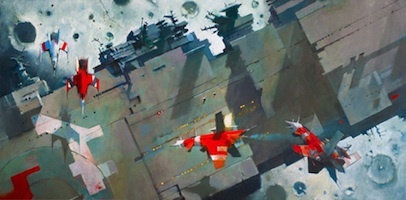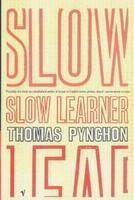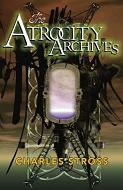 How do you follow on from something as successful as Ancillary Justice, which has won about everything worth winning in the SF field? (a slight overstatement, I know, but it feels like it).
How do you follow on from something as successful as Ancillary Justice, which has won about everything worth winning in the SF field? (a slight overstatement, I know, but it feels like it).
Ann Leckie's answer, as delivered with her 2nd book, Ancillary Sword, is: by continuing straight onwards, without stopping and having to build up again, and with very little scene setting for the 2nd part in the series. It's as if we've never been away...
And yes, people not having read the first book need not apply (and this review will also not make much sense. Sorry!)
Either way, we pick off where the previous book left off, and set off with Breq in command of the Mercy of Kalr, on route to Athoek Station, which is the only place where Anaander Mianaai, the Lord of the Radch, can order her to go and know she will do so. Why? Because there lives the little sister of Lieutenant Awn, Breq's favourite officer when she was still the ship Justice of Toren. And whom she killed, on direct of order of Anaander Mianaai. It's a long story – actually the size of the first book...
With her as part of her new crew (humans, not Ancillaries, even if they pretend to be) she has a brand-new, green, 'baby' Lieutenant Tisarwat, who is unmasked quite early on as no-one but Anaander herself, under cover. The machinations Breq goes through to unearth this hugely reminded me of a book I read ages ago, and which, to my annoyance, I still cannot pin down or name (contact me if you're really well-read in older military SF!).
On Aethoek station things are in disarray due the on-going civil war within the Radch empire, which mainly impacts in the form of a travel and communications embargo. But there is more going on behind the scenes, much more. Ime station, which is something Breq is obsessed with anyway, is a frequent touch point mentioned.
The story is told, as in the first book, through Breq's eyes. It is worth noting that our knowledge is not equal, though – we don't learn all she knows, only what we're told. There is very conscious withholding of (frequently key) information, something which rather annoyed me at times.
The use of language from the Radch continues, ie we get only female pronouns whilst Radch is spoken (this is different for languages which do have male/female concepts). There are some interesting variations in this – we get Person, but parent/child relations are represented with Mother and Daughter. And the military address is Sir!, which had me chuckle for rather silly reasons...
We also continue observing Breq trying to pass as human – the funnies bit in this was when she is playing the Aristocrat by emulating Seivarden as her model! She also comes across as so damn superior at times, with all her experience. But she's not as driven as in the first book, but much more calculating, scheming. False. And when Dlique, the proto-human translator for the Presger is killed, it feels like she is actually losing control; very much in contrast to how she appeared and acted during the trip to Athoek Station.
But of course she's fighting her own demons, from her past, from Lt. Awn, her sister, and with her rather dysfunctional relationship with Anaander Mianaai.
The book takes a long time to get going, to put all the pieces on the board. All the more so as this is a middle third to an already moving story! But halfway into the book it felt like the story was starting to move of it's own, even if I still had the impression that she was holding back a key piece, even at that point.
There generally is an awful lot of faffing about with station/ship/Radch politics, class thinking, and verbatim reported discussions and verbal sparring. I can't say I totally appreciated this; in the previous book such things displayed who Breq is, and why, but here it feels over-demonstrated and rather tedious at times.
I also note a lot more mention of skin tones – either there is more here, or I didn't catch this in the first book? Radch are dark-skinned with curly hair. Annexed cultures can look different (which is a source of snobbery), and there is mention of someone with artificially darkened skin.
But whilst we learn what's wrong with Aethok Station, and wait for the final part of the series to commence (classic middle book problem) we mainly learn more of what we already knew – Breq has a problem, inasmuch as she used to be a ship, with thousands of Ancillaries, thousands of eyes, voices, bodies; and that what Mercy of Kalr is able to provide her with is only a pale approximation of what she lost, more a reminder of what she lost than a fulfilment of her needs.
There are loads of reported discussions and interactions, a lot of them running in parallel in different places, overlapping. This includes non-verbal cues, as the ship (and Breq through it) sees the physical reasons, the moods of its crew. Breq has a huge information advantage through being this close to the ship, even if the integration is limited.
Don't get me wrong, this is a perfectly readable book, even if a little slow and less driven than the first instalment in the series. If you liked Ancillary Mercy then this is very much worth reading, both on its own as well as a setup for the final book in the trilogy (to be published late in 2015).
I don't think there's much point in starting with this book, or trying to read it as a stand-alone, it's not set up for this, and I would not expect it to work.
More Ann Leckie
Title: Ancillary Sword
Author: Ann Leckie
Series: Imperial Radch
Series Number: 2/3
Reviewer: Markus
Reviewer URL: http://thierstein.net
Publisher: Orbit
Publisher URL: http://www.orbitbooks.net
Publication Date: 2014
Review Date: 151008
ISBN: 9780356502410
Price: UKP 8.99
Pages: 356
Format: Paperback
Topic: SF
Topic: AI














